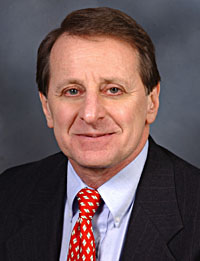 | Dr. Stephen G. Waxman |
Dr. Stephen G. Waxman, the new Bridget Marie Flaherty Professor of Molecular Neurology, is a renowned neurologist and molecular neuroscientist whose research has elucidated the roles played by sodium channels -- specialized molecules that produce electrical impulses within nerve cells -- in multiple sclerosis (MS), spinal cord injury and neuropathic pain.
The chair of the Department of Neurology, Waxman holds a joint appointment in the Department of Pharmacology and directs Yale's PVA/EPVA Center for Neuroscience Research at the West Haven Veterans Affairs Medical Center. He is neurologist-in-chief at the Yale-New Haven Medical Center and co-director of the Yale-University College London Collaboration on Neural Repair.
Waxman has devoted much of his career to studying nerve fibers that have lost their protective myelin coat. His research on nerve impulse conduction in normal and demyelinated nerve fibers (or axons) has revealed that damaged axons can reorganize themselves and establish new sodium channels, even in areas that have been stripped of their myelin. The Yale neurologist has also explored ways to rescue nerve fibers before they degenerate or die, and is engaged in investigations on how to regrow nerve fiber. As a result of his research, clinical trials and other therapeutic strategies are being developed to treat patients with MS and nerve injuries.
Waxman has written or edited a number of books, including "The Axon," "Diseases of the Spine and Spinal Cord" and the forthcoming "Multiple Sclerosis as a Neuronal Disease."
A graduate of Harvard College, Waxman earned Ph.D. and M.D. degrees from Albert Einstein College of Medicine in New York. He completed his residency at Boston City Hospital. He taught at the Marine Biological Laboratory in Woods Hole, Harvard University, the Massachusetts Institute of Technology and Stanford University before joining the Yale faculty in 1986. Since 1998, he has also been a visiting professor at University College and the Institute of Neurology in London.
The Yale scientist has received numerous honors for his work, including the National Multiple Sclerosis Society's Reingold Award and the Wartenberg Award from the American Academy of Neurology. He is a fellow of the Royal Society of Medicine and the American Academy of Neurology, and is an elected member of Institute of Medicine of the National Academy of Sciences and the American Association for the Advancement of Science, among other scholarly societies.
T H I S
Dr. Stephen G. Waxman is
appointed to Flaherty chair W E E K ' S
W E E K ' S S T O R I E S
S T O R I E S![]()
 Team creates blood test for 'silent killer'
Team creates blood test for 'silent killer'![]()
![]()
 University marks 100 years of 'Pomp and Circumstance'
University marks 100 years of 'Pomp and Circumstance'![]()
![]()
 Yale scientist featured in new stamp series
Yale scientist featured in new stamp series![]()
![]()
 Twelve honored for strengthening town-gown ties
Twelve honored for strengthening town-gown ties![]()
![]()
 ENDOWED PROFESSORSHIPS
ENDOWED PROFESSORSHIPS Two appointed to Sterling chairs
Two appointed to Sterling chairs![]()
 R. Howard Bloch: French and Medieval Studies
R. Howard Bloch: French and Medieval Studies![]()
 Ian Shapiro: Political science and YCIAS
Ian Shapiro: Political science and YCIAS![]()
 Romano named Ruebhausen Professor
Romano named Ruebhausen Professor![]()
 Waxman is appointed to Flaherty chair
Waxman is appointed to Flaherty chair![]()
 Dr. State has been designated Harris Assistant Professor . . .
Dr. State has been designated Harris Assistant Professor . . .![]()
![]()
 Krauss named to second term at Silliman
Krauss named to second term at Silliman![]()
![]()
 Researchers discover virus' potential to target and kill deadly brain tumor
Researchers discover virus' potential to target and kill deadly brain tumor![]()
![]()
 Yale professors endow teaching and research fund in the history of science
Yale professors endow teaching and research fund in the history of science![]()
![]()
 Study shows, when it comes to fish genitalia, size has pros and cons
Study shows, when it comes to fish genitalia, size has pros and cons![]()
![]()
 Two Yale scientists honored with election to the NAS
Two Yale scientists honored with election to the NAS![]()
![]()
 Six Yale affiliates elected fellows of scholarly society
Six Yale affiliates elected fellows of scholarly society![]()
![]()
 Beijing conference explored Chinese constitutionalism
Beijing conference explored Chinese constitutionalism![]()
![]()
 New scholarship will help nurture future activist ministers
New scholarship will help nurture future activist ministers![]()
![]()
 Yale-IBM computer facility formally dedicated
Yale-IBM computer facility formally dedicated![]()
![]()
 REUNIONS
REUNIONS Alumni will gather for talks, tours and other special events
Alumni will gather for talks, tours and other special events![]()
 Library exhibit celebrates the accomplishments of the Class of '55
Library exhibit celebrates the accomplishments of the Class of '55![]()
 Medical school reunions feature talks on cutting-edge research
Medical school reunions feature talks on cutting-edge research![]()
![]()
 Yale launches research on lung cancer . . .
Yale launches research on lung cancer . . .![]()
![]()
 Workshop will explore technology's power to capture . . .
Workshop will explore technology's power to capture . . .![]()
![]()
 Show features artist's colorful depictions of 'Northern Shores'
Show features artist's colorful depictions of 'Northern Shores'![]()
![]()
 Glen Micalizio wins Beckman Young Investigator award . . .
Glen Micalizio wins Beckman Young Investigator award . . .![]()
![]()
 IN MEMORIAM
IN MEMORIAM Benjamin Mordecai: Drama school teacher and Broadway producer
Benjamin Mordecai: Drama school teacher and Broadway producer![]()
 Memorial service to honor South African historian Leonard Thompson
Memorial service to honor South African historian Leonard Thompson![]()
![]()
 Campus Notes
Campus Notes![]()
Bulletin Home |
| Visiting on Campus
Visiting on Campus |
| Calendar of Events
Calendar of Events |
| In the News
In the News![]()
Bulletin Board |
| Classified Ads
Classified Ads |
| Search Archives
Search Archives |
| Deadlines
Deadlines![]()
Bulletin Staff |
| Public Affairs
Public Affairs |
| News Releases
News Releases |
| E-Mail Us
E-Mail Us |
| Yale Home
Yale Home